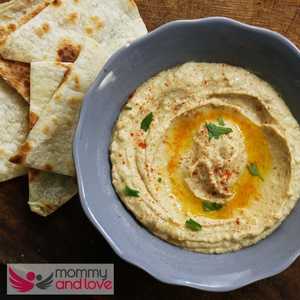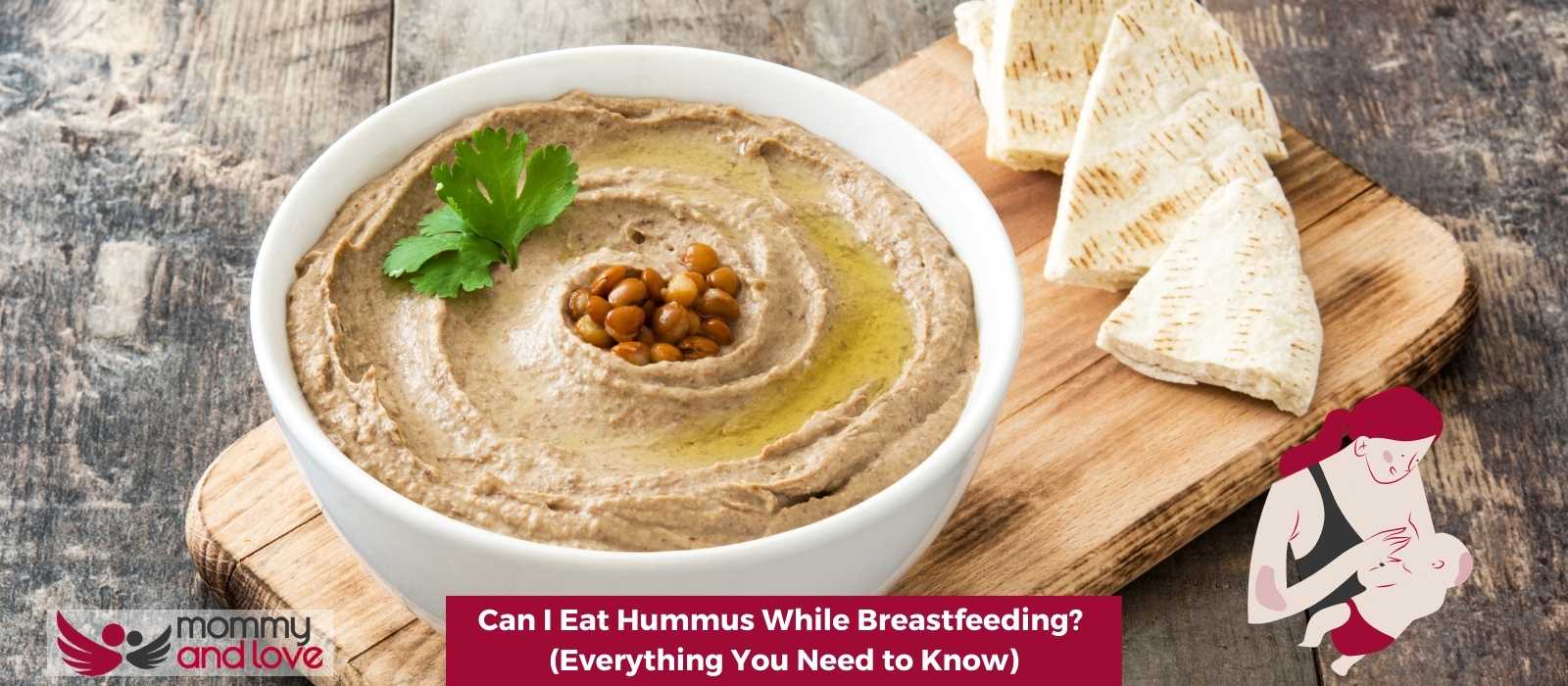If you’re breastfeeding, you may be wondering if it’s safe to eat hummus. Is there any risk of your baby getting sick if you enjoy a few bites of this popular dip? Keep reading for the answer, along with some other tips on what to eat while breastfeeding.
Can a breastfeeding mom eat hummus? Yes, a breastfeeding woman can eat hummus. Hummus is a high-protein snack that contains ingredients known to increase breastmilk production. It is also a great way to get some extra protein and calcium into your diet. However, it does contain salt and garlic so limit your portions. Hummus is a healthy and convenient snack to eat while breastfeeding.
What Is Hummus?

Hummus is a traditional Middle Eastern food made from cooked, mashed chickpeas, tahini, lemon juice, olive oil and garlic.
Chickpeas are soaked overnight before being boiled for several hours. They are then drained and mashed with tahini (sesame seed paste), which makes hummus creamy and rich in flavor.
It also contains a little bit of garlic, lemon juice and olive oil as well as salt and pepper to enhance the flavor even more. Hummus can be enjoyed on its own or with other foods like pita bread or vegetables such as sweet potatoes, cucumbers or tomatoes.
What Are the Benefits of Eating Hummus While Breastfeeding?
Chickpeas are a key ingredient in hummus. Chickpeas are natural galactagogues, which encourage lactation. Furthermore, getting complete protein is essential for producing enough breastmilk for your infant. Eating chickpeas offer the highest protein availability of any legume or plant, helping to improve the quality and quantity of your breastmilk which makes it a perfect and delicious snack for breastfeeding moms.
Garlic is thought to be a galactagogue, and it has long been used as a herbal treatment to stimulate breast milk production and increase breast milk supply.
When breastfeeding mothers took garlic, their infants stayed at the breast and nursed longer, according to research.
And, because increased nursing can lead to an increase in breastmilk supply, this could be one of the reasons garlic can help nursing moms produce more breast milk.
Hummus also contains vitamin B which is important for making sure the body’s cells are functioning properly and vitamin K is important in assisting blood clotting and minimizing excessive bleeding.
What Are the Issues With Eating Hummus?
Hummus has high salt content, and certain commercial versions may also have a high sodium content. Salt is an essential nutrient, however, a high sodium intake is associated with an increased risk of high blood pressure. This can increase the chance of getting heart disease over time.
Additionally, consuming an excessive amount of hummus can result in foul-smelling flatulence. This is largely due to raffinose, a sugar (or carbohydrate) found in chickpeas. Brussels sprouts contain raffinose as well, which may cause you to pass foul gas after eating them.
It has also been debunked that certain foods like spicy foods are among the foods that breastfeeding women should avoid while breastfeeding. So a little spicy hummus is okay.
The other concern regarding eating hummus is that it might cause infant gas. Chickpeas are quite infamous for making a baby gassy. Intestinal gas in a baby’s digestive system can make her irritable and uncomfortable.
How Much Hummus Can I Eat When Breastfeeding?

A 2-tablespoon portion of hummus has around 70 calories. You could consume three servings each day, one with lunch, one with dinner, and one as a healthy snack, for a total of 210 calories.
Does Hummus Affect Breast Milk Supply?
Yes, many of the ingredients of hummus are considered galactagogue which means they help increase a mother’s breast milk supply.
Nursing mothers need an adequate supply of breastmilk which is why they are encouraged to eat only nutritious food, have a well-balanced diet and consume protein-rich foods.
Breastfeeding aids in the defense against infections, the prevention of allergies, and the prevention of a variety of chronic diseases so more milk is always better. Many experts recommend that babies breastfeed exclusively for the first six months of their lives. Breastfeeding is recommended for at least 12 months, and longer if both the mother and breastfed baby are willing.
Garlic is another ingredient in hummus. Garlic is completely safe for moms and breastfed babies and it may even help improve your milk production. However, be warned that garlic can cause colic in some newborns, so you may need to avoid it for a while because it passes through milk.
Can breastfed babies be allergic to hummus?
Yes, because most of the ingredients of this yummy snack particularly chickpeas and garlic can pass through breast milk.
If your children exhibit symptoms of food allergies, your first thought may be to blame the most prevalent ingredient, chickpeas. Before you blame chickpeas for your allergies, you should investigate other allergenic ingredients in hummus, such as garlic.
Signs of food allergy include:
- rash or hives
- swelling
- itching
- upset stomach
- diarrhea
- difficulty breathing
If your notice any of these symptoms on your baby seek medical attention right away.
Take Away on Hummus for the Breastfeeding Mother
It is important for mothers to know what foods to eat and what to avoid while breastfeeding. Hummus is a great snack to eat while breastfeeding, why not combine with some crawfish, because it is high in protein and contains ingredients that are known to increase breastmilk production.
However, be mindful of the salt content in hummus and how much you consume each day. Additionally, if your baby exhibits signs of a food allergy, consult your doctor immediately.

This article was written by Sandra Baker – full time writer and the mother of four amazing kids (including twins!)
She’s also a breastfeeding counselor and has spent years helping new parents learn how to care for their children. When she’s not writing or caring for her children, Sandra likes to spend time reading and taking walks with her husband.




